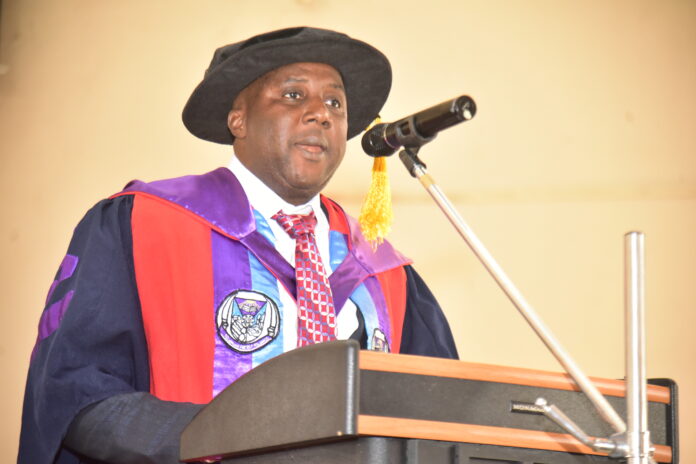A professor of Animal Physiology and Reproduction at the Federal University of Technology Akure, FUTA, Olufemi Adu, has said that use of augmenters such as supplements and antibiotics in animal feed production can lead to hormonal imbalances, affecting health and reproductive outcomes of animals and called for proper usage to enable positive impact on the animals. He said despite their numerous advantages, excessive supplements may disrupt natural processes while additives might have unintended side effects, affecting the overall wellbeing of animals and invariably man.
Professor Adu stated this while delivering the 175th Inaugural Lecture of the university with the title: The Provender’s Augmenters in Animal Physiology and Reproduction: The Good, The Bad and the Ugly on Tuesday, 10th December 2024 at the Obafemi Awolowo auditorium hall of the institution. Professor Adu said, “improper use of augments has potential drawbacks, overdosing may result in toxicity, while deficiencies can occur if formulations are inadequate. Additionally, overuse or improper formulations may lead to imbalances, impacting heath and reproductive outcomes.”
The don defined augmenter as substances or agents that are added to animal feed to improve nutritional or growth rate. He said, “Augmenters added to provender play a crucial role in enhancing animal physiology and reproduction for sustainable livestock production. They address nutritional gaps, support optimal heal and improve reproductive performance ultimately contributing to increased productivity and efficient resource utilization in livestock farming. Overall, when used responsibly they can be valuable tools for optimizing animal well-being and reproductive outcomes.” According to him, results have shown that they can contribute to improved health, fertility, and overall productivity in livestock, address nutritional deficiencies, promote better growth and development, and enhance digestive health leading to increased nutrient absorption and efficiency.
He however warned against indiscriminate use of augments adding that it is crucial to follow recommended guidelines to avoid potential adverse effects. He said improper use may also contribute to anti-biotic resistance, environmental pollution and hormonal imbalance if not managed responsibly. He said, “total reliance on these substances may mask underlying issues that could be better addressed through proper nutrition and management practices.”
Professor Adu recommended that farmers should consult with nutritionists to determine the best feed supplements for their livestock ensuring proper storage and handling of supplements to maintain efficacy. He called for use of natural and sustainable supplements such as whole kenaf seed meals, nutmeg meals, cloves leaf meal, ginger meal, black pepper, alligator pepper, tiger nut, moringa leaf meal, among others. In addition, he said “feed milers should formulate feeds with scientifically proven supplements to ensure quality control and quality assurance measures as well as providing technical support to farmers and also embrace collaboration with research institutions.”
The lecturer called on government to “support research on sustainable and effective feed supplement, provide incentives for farmers using environmentally friendly supplements to promote sustainable practices and develop programs for public education on responsible supplement usage.“ He also added that there should be establishment of clear regulations and guidelines for feed supplement usage and monitoring among livestock professionals.
Adu also advised that, “feed supplements should generally be used judiciously, considering animal needs, environmental impacts and animal health and welfare. Quality and efficacy of supplements should be monitored and adjusted to suit varying levels of animal performance and requirement, which should be adhered to according to regulatory guidelines and industry standards.”
In her capacity as Chairman, the Vice Chancellor, Professor Adenike Oladiji represented by the Deputy Vice Chancellor, Development, Professor Sunday Oluyamo described the lecturer as an erudite scholar who has contributed immensely to research and academic development in his field of specialization.
She commended him on the cerebral delivery of the lecture saying that the topic was apt given the need to ensure increased livestock production through a better exploitation of the production and reproduction potential of animals using supplements.




